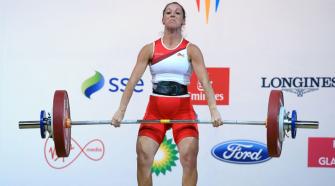- HOME
- NEWS & INSIGHTS
- THOUGHT LEADERSHIP
- behind-scenes-birmingham-2022-competition-manager-jo-calvino
Image

You often hear athletes mention ‘the Team behind the Team’ in post-competition interviews as they give thanks for the wider support they receive on a day-to-day basis.
This may typically refer to coaches, physiotherapists, strength and conditioning experts, performance analysts, family, friends….the list goes on and varies from athlete to athlete. So what does it take for Team Leaders, Chef de Missions and Competition Managers to bring the whole operation together from top to bottom for a major Games?
Our new feature series, entitled ‘Behind the Scenes With’, sees experienced support staff offering insight into the processes involved in preparing for a major Games. Current and previous Team Leaders and Chef de Missions will share their experiences to help better understand their roles, the detailed planning in the build-up to a Games, and the key considerations during competition-time.
This time in the hotseat is Jo Calvino.
Jo competed at four Commonwealth Games for Team England and made up part of the nation’s first women’s weightlifting team at Manchester 2002. Her best finish would be fourth place, four years later, before ending her career as an athlete at Glasgow 2014. Jo will once again experience a home Games at Birmingham 2022....but this time as the Weightlifting and Para Powerlifting Competition Manager.
Here, Jo reflects on her role and experiences in a special blog written for Team England Futures...
“My past experience has really helped me - previously I'd worked in events in my old sport of diving. I learnt the importance of having the technical knowledge and understanding of the sport, understanding the requirements from the athletes’ perspective and the team's perspective, in terms of what needs to be done, what needs to be in place. Certainly, continuing to learn to work with a flexible attitude. You can have everything in place and then one decision or one instance can ruin that. That ability to refocus and review the work that you're doing. I think sport has certainly taught me the skills to be able, in my professional capacity, to learn to be patient, learn to work as a team and just listen to other people's advice because there are times when we are probably our toughest critics.
“The experience I've had to go into different Games and understanding the concerns from athletes or concerns from teams, learning how to put that into an event and just manage the many different groups and stakeholders that we've got to keep happy with it, has stood me in good stead. You also have to bear in mind that when pressure is high people behave differently. So you have to understand those scenarios and the reasons behind it and I think it's definitely given me the ability to handle stress. With the sort of jobs I’m doing, handling pressure and stress on a day-to-day basis, it is no different to the athlete trying to handle the pressure of expectation and performance.
“For the past year, a lot of time has been spent around venue design, making sure we're getting the sport equipment contracts, making sure we've got enough tables, chairs, towels, water. Just looking at the areas that the athletes will use, making sure that the actual field of play and the stage design is functional and works within the International Federation’s regulations. Now, as we get closer and we've got athletes confirmed and teams confirmed, we're really starting to finalise things like training schedules. We're looking a little bit more into the sports presentation detail in terms of how we're going to present the sport and the graphics and all the things that come with that. We're just finalising things like what dates equipment will be delivered, when we're going to actually be able to access spaces and areas to set them up and be ready for training - for when the Village is open and then ready for competition.
“My role is making sure that athletes and teams are happy with the training facility, it will be making sure our Technical Officials also arrive and they're safe and well, the same priorities of keeping athletes and teams safe. Once the competition starts, it is my job to make sure the competition runs smoothly and everything is where it should be, exact timings right down to the second, and that's what we're working on now is those time schedules and they're very precise. Hopefully, I'll get to see bits of the competition but my job will be making sure everything is running and operating as it should be.
“Success comes in many forms, I think the first one will be if we can deliver a successful and safe Games, without too much drama in terms of COVID-19 cases or actually delivering the event to schedule….getting everything running on time is always a great success. I also think if the athletes are happy and they've enjoyed their time at Birmingham and they've had a great experience. We know that not every athlete is going to achieve what necessarily they want to achieve, but we want to make sure that they've enjoyed their moment on the stage, they've felt like they are the priority in that moment and they've created memorable experiences that will last them a lifetime. I think making sure that the international federations and the city of Birmingham are also happy with what's been delivered. It can come in so many different ways, the success, but for me, I think making sure the athletes have had the best experience possible and had minimal stress to be able to focus on what they need to do….that's priceless.”
Commonwealth Games England has appointed SportsAid to lead on the development, management and operational delivery of Team England Futures at the Birmingham 2022 Commonwealth Games. The programme, supported by Sport England, will reinforce the importance of the Commonwealth Games, particularly one hosted on home soil, as a developmental opportunity within the talent and performance pathway!

